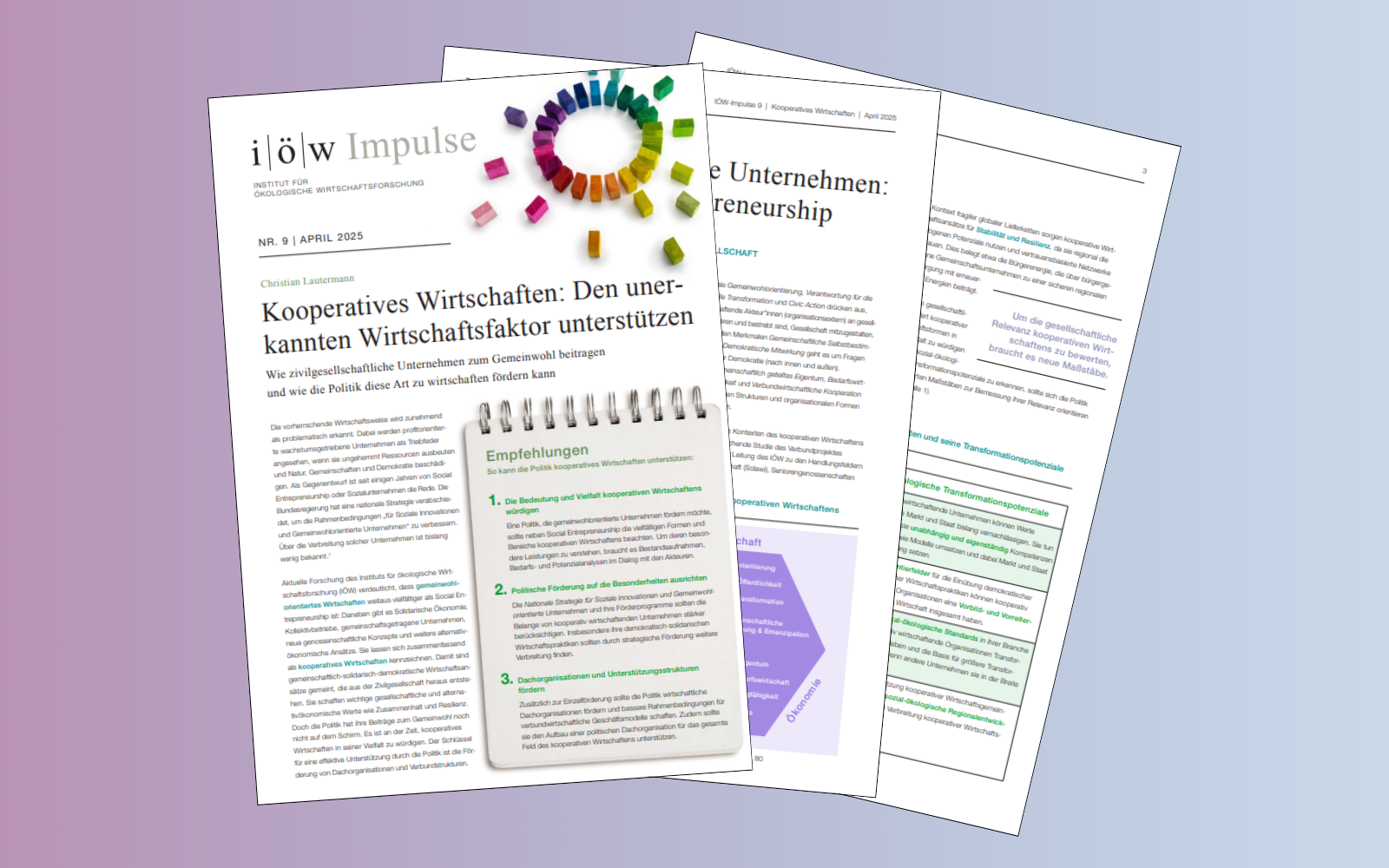Beyond the economic mainstream, there are diverse and indispensable alternative economic actors: solidarity economy, collective enterprises, community-based enterprises, new cooperative concepts.
Co-operative enterprises are creating important social and alternative economic value in fields such as community energy, community-supported agriculture, platform co-ops and senior citizens‘ co-operatives.
The Institute for Ecological Economy Research (IÖW) recommends that the German government support the newly founded Cooperative Economy Association – the first cross-sector umbrella organisation of its kind.
Berlin, April 7, 2025 – Community-supported agriculture, energy cooperatives, platform cooperatives and retirement communities do a lot for society: as organisations oriented towards the common good, they ensure social cohesion, enable citizen participation, drive forward the energy or food transition or offer a democratic alternative to profit-oriented platform companies. People are often involved in these organisations on a voluntary basis and operate less visibly than large companies. They are a relevant ‘unrecognised economic factor’, says business researcher Christian Lautermann from the Institute for Ecological Economy Research (IÖW).
In the impulse paper ‘Cooperative Economy: Supporting the Unrecognised Economic Factor’, it recommends that the Federal Government promote the newly founded Cooperative Economy Network. The Institute is publishing the recommendations on the occasion of the ‘Forum for Social Innovation and Public Welfare-Oriented Enterprises’, which the Federal Ministry of Economics and Climate Protection (BMWK) and the Federal Ministry of Education and Research (BMBF) are holding jointly in Berlin on 8 April 2025.
Indispensable for the common good and cohesion
„They can be found all over Germany and there are many of them. But politicians have so far paid too little attention to the achievements of co-operative companies that are anchored in civil society. Yet their contributions to the common good and social cohesion are indispensable,‘ explains Lautermann, who led the project network ’Teilgabe – kooperatives Wirtschaften in der Zivilgesellschaft“ (Sharing – Cooperative Business in Civil Society), which is funded by the Federal Ministry of Education and Research. At a Federal Assembly on Cooperative Economy organised by the Teilgabe project, civil society companies came up with the idea for the Cooperative Economy Network, which was founded as an umbrella organisation at the end of 2024.
‘The extent of the added value and economic output that companies that are organised for the common good generate is barely known,’ says Lautermann. „It is time for a scientifically supported inventory of cooperative forms of business in Germany.
By visualising the scope and extent of the diverse field of companies and initiatives oriented towards the common good, they can be supported and promoted much more specifically.“ The expert on sustainable business recommends that the Federal Ministry for Economic Affairs and Energy adapt and expand the federal programme ‘Nachhaltig wirken – Förderung gemeinwohlorientierter Unternehmen’ (Working sustainably – promoting companies for the common good) after surveying the field in this way.
Permanently promoting cooperative business
In the impulse paper, the IÖW makes suggestions as to how cooperative business should be permanently promoted: for example, the IÖW suggests that a national innovation and start-up centre could multiply the impact of organisations oriented towards the common good. By helping to ensure that cooperation takes place across different supply sectors such as food, energy or housing, the socio-ecological transition could benefit as a whole.
As cooperative economies are rooted in civil society, they are usually organised in a decentralised manner, close to the people, supported by local communities and anchored in the region. ‘Collaborative economic cooperation is central to the development of cooperative economic practices,’ explains Lautermann. „In order to leave the niche and have a broad impact, it is advisable to join forces and form joint umbrella organisations.
Mit dem Verbund Kooperatives Wirtschaften gibt es hierfür erstmals eine gemeinsame sektorübergreifende politische Dachorganisation für alle demokratisch und solidarisch wirtschaftenden Unternehmen. Die Politik sollte diese Interessenvertretung bei ihrem Aufbau und ihrer Etablierung unterstützen. Denn eine starke Dachorganisation kann wertvolle Beiträge für Gemeinwohl und nachhaltiges Wirtschaften in Deutschland leisten.“
The Cooperative Economy Network is the first joint cross-sectoral political umbrella organisation for all companies that operate democratically and in solidarity. Politicians should support this interest group in its development and establishment. After all, a strong umbrella organisation can make valuable contributions to the common good and sustainable economic activity in Germany.“
further Information:
Impulspapier „Kooperatives Wirtschaften: den unerkannten Wirtschaftsfaktor unterstützen“: (https://www.ioew.de/impulse-kooperatives-wirtschaften)
„Forum für Soziale Innovation und Gemeinwohlorientierte Unternehmen“ am 8. April 2025:
(https://sigu-plattform.de/forum-fuer-soziale-innovationen-und-gemeinwohlorientierte-unternehmen/)
Bundesprogramm „Nachhaltig wirken – Förderung gemeinwohlorientierter Unternehmen“:
(https://www.foerderdatenbank.de/FDB/Content/DE/Foerderprogramm/Bund/bmwk-gemeinwohlorientierte-unternehmen.html)
Originalpublikation:
Christian Lautermann (2025): Kooperatives Wirtschaften: den unerkannten Wirtschaftsfaktor unterstützen, IÖW-Impulse 9, April 2025 (https://www.ioew.de/impulse-kooperatives-wirtschaften)
ImageSource
IÖW 2025


